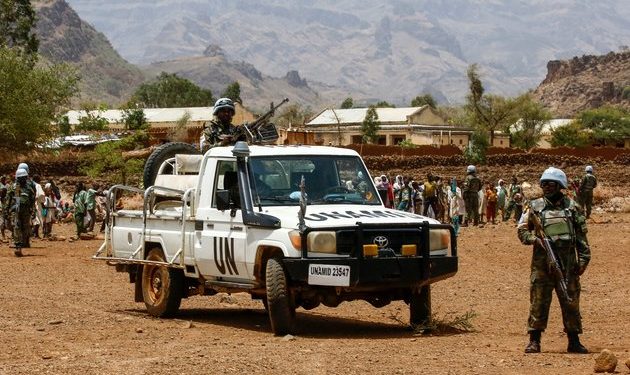KHARTOUM, SUDAN – Fourteen bases that had been run jointly by the United Nations and the African Union in Sudan’s Darfur region for 13 years are now under Sudan’s control and to be used by local populations.
The recent official handover comes in accordance with a framework agreement signed on March 4 between the United Nations and African Union Mission in Darfur (UNAMID) and Sudan.
The U.N. Security Council voted last year to turn over the sites to the Sudanese government, but M’Baye Babacar Cisse, U.N. assistant secretary-general, said the repatriation of equipment and staff from Darfur had been going on for four months.
“The main beneficiaries in fact were the local communities and the IDPs (internally displaced persons) and the teams’ sites were supposed to be used as vocational training centers, education centers, clinics, health centers or community activity centers,” Babacar told VOA’s South Sudan in Focus program.
Eight of the 14 sites were stripped bare by looters from the local communities in Darfur. But some of the sites are serving locals, Babacar said, referencing the former outposts known as Zalenji and Kalma.
Zalenji “is now [under] the University of Zalenji,” where early occupation of the sites by the university of the same name prevented looting, he said.
“… Kalma was transferred to the IDPs and now they are the ones managing Kalma as [a] health center,” Babacar told VOA.
UNAMID repatriated its peacekeeping equipment to its respective countries along with about 6,000 staff members who had performed peacekeeping operations in Darfur since December 2020. Some of those operations, however, were interrupted by the COVID-19 pandemic, Babacar said.
“We had at the end of December 2020 programmatic activities as well as state liaison projects that were implemented by the U.N. agencies that were not completed because of the COVID crises that affected the operation.”
The pandemic interrupted some community projects that were directly under the supervision of Civil Affairs of UNAMID, including water projects and community engagement workshops with youth, women and local traditional leaders.
The U.N. diplomat said Sudan’s transitional government now has the responsibility of protecting civilians against attacks in Darfur.
“The government is committed to putting together a joint force to protect the local community and the U.N. will continue to support that end, but we will no longer have a physical protection mandate,” Babacar told VOA.
During UNAMID’s 13-year mandate, it had more than 97,000 peacekeepers including military and police in Darfur, drawn from 110 countries. It will leave behind a small contingent estimated to be 1,000 to 1,500 individuals.
Hundreds of people have been killed or wounded this year in Darfur, an area plagued by deadly violence for decades during the administration of former President Omar al Bashir.
Dozens of people were killed in January shortly after the peacekeepers announced their phased withdrawal from the region. Arab militias attacked a displacement camp in El Geneina, the capital of West Darfur. Five days of fighting between Arab and Masalit tribesmen in April left 87 people dead and more than 190 people wounded, according to the Sudanese Doctors Committee in West Darfur.
Carol Van Dam Falk contributed to this report.






